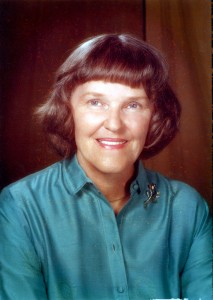Martha Heasley Cox: A Legacy of Giving

The College of Humanities and the Arts is deeply grateful for a bequest from the estate of Martha Heasley Cox in the amount of $4.8 million. The gift is dedicated to the Martha Heasley Cox Center for Steinbeck Studies, which houses one of the world’s largest archives of materials related to John Steinbeck.
The Steinbeck Center grew out of Martha’s single-minded commitment to Steinbeck’s work. During her 34 years of teaching at SJSU, she focused her research on Steinbeck, and collected the materials that serve as the foundation for the Center’s collection. Martha provided financial support for Center operations for many years, including the Center’s signature Steinbeck Fellows Program, which provides emerging writers with a $10,000 fellowship to finish a significant writing project. Approximately 75% of the bequest will expand the Fellows program, which currently brings two to three scholars to campus per year to write and share their work. Thus far, the Center has hosted 38 Fellows, including writers of fiction, non-fiction, and poetry.
![]() Associate Professor Nick Taylor, the Director of the Center for Steinbeck Studies, explains that the gift will bring the Steinbeck Fellows Program one step closer to Martha’s vision. “Martha imagined that we would have enough money to bring all these people to campus—a fiction writer, a dramatist, a journalist, a marine biologist—and have them sit around a table and share their work.” The bequest will allow the Center to greatly expand the program and invite a wider range of scholars to join the campus community as they further their work.
Associate Professor Nick Taylor, the Director of the Center for Steinbeck Studies, explains that the gift will bring the Steinbeck Fellows Program one step closer to Martha’s vision. “Martha imagined that we would have enough money to bring all these people to campus—a fiction writer, a dramatist, a journalist, a marine biologist—and have them sit around a table and share their work.” The bequest will allow the Center to greatly expand the program and invite a wider range of scholars to join the campus community as they further their work.
The bequest will also allow the Center to expand their online secondary bibliography, a database that Martha dreamed would include “absolutely everything that’s ever been written about Steinbeck.” The bequest will allow the dedication of more resources to the project, working to realize Martha’s original vision.
“The true value of the vision of some people gets revealed years after they’re gone,” remarked Nick Taylor. “Martha was pretty insistent in her lifetime about what she wanted to do and what she wanted to accomplish. She proves that your work can be continued on in exactly the same manner that you intended it long after you’re gone. All of the mechanisms are in place—endowments and physical spaces, collections, awards series. She was incredibly generous with the University; she loved this place. And she’ll never be forgotten.” Professor Cox’s generosity exemplifies the tremendous impact that a visionary donor can have on generations of students, faculty, and community members.
By Kaitlynn Magnuson & Associate Dean Kathleen McSharry

